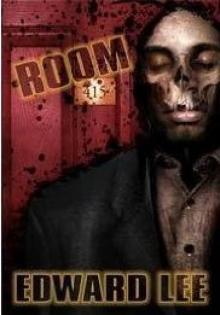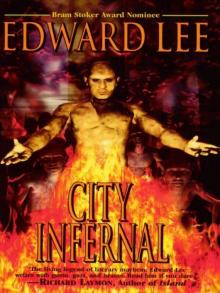- Home
- Edward Lee
The Innswich Horror Page 2
The Innswich Horror Read online
Page 2
In Lovecraft’s The Shadow Over Innsmouth, the protagonist checks into a motel called the Gilman House, and now here I stood looking at a motel called the Hilman House. I’m sorry, but this was more than coincidence. It had to be. Something about this tedious town, without a doubt, impressed Lovecraft enough to at least borrow some names from it, and I was suddenly convinced that there must be more influences waiting to be divulged.
Garret peered close, concern in his eyes. “Mr. Morley? Are you all right?”
His voice snapped me out of my mental revel. “Oh, sorry. Something sidetracked me. But, you know what? I think I’ll be staying on for a few days after all.”
“Splendid!” He whispered again, through a tight smile. “It’ll be good to know that I’m not the only normal person in town.”
I laughed distractedly but before I could say more…
“Hello, gentlemen,” a soft voice greeted.
We both turned to take wide-eyed note of a commonly attired yet perfectly attractive woman. She strolled down the walk, arms full of groceries, and grinned more than typically at the two of us.
Garret tipped his hat. “Miss…”
“Gorgeous day, isn’t it?” I plodded.
“Oh, yes it is,” and that was the extent of our discourse.
“There’s a looker,” Garret whispered.
“I should say so,” I remarked, actually a bit ashamed, for this woman’s over-typical good looks gave me cause peer more than I should’ve. Her bosom could be described as raucous, as she was not only endowed but appeared un-brassier’d. The respect I had for my Christian faith reminded me what Jesus said regarding lust, but not in enough time to avert my eyes.
“As they say in England,” chuckled my friend, “there goes the apple-dumpling cart,” but then he leaned closer to denote discretion, “but that’s another queer thing about this little town.”
“That being?”
“I’m serious, man. I’ve never seen so many pregnant women in one place in my life.”
“Preg—” I began, and when I gave myself another yet more distanced glance, the more than moderate gibbosity of the woman’s abdomen told all. “Well, I’ll be. You seem to be correct.”
“Four or five months at least, and it’s not the first biscuit in that one’s oven, either.”
I looked dismayed. “How on earth can you tell that?”
He elbowed me with a grin. “You saw the jugs on her. They’re still filled up from the last one.”
The uncultivated talk was making me uneasy, for it wasn’t my bent. “But, really, what did you mean when you said you’ve never seen so many—”
“This town—I’m serious. I’ll bet that’s the dozenth pregnant woman I’ve seen since I’ve been here, and I’m telling you, most of them have been lookers.”
“Really… Still, it’s a good thing, if you don’t mind my opinion. The government is wise to encourage propagation since the Spanish Flu epidemic of ‘18. We lost half a million in that, they say, and almost all of them young men.”
Garret nodded grimly. “And right after losing—what?—another hundred-some thousand more men in that devilish war with the Huns. I agree with you. America needs more birthing, especially if we have to get into this next one with Germany, like so many believe.”
I wasn’t sure how I felt on this subject; I tended to trust authority. “But the President just declared neutrality in the European War.”
“It doesn’t give me much comfort, I’ll tell you. Right after Germany and Russia signed the non-aggression pact, look what happens. Russia invades Finland. And don’t believe that Brit Neville Chamberlain either. Peace in our time? Hitler’s pulling the wool over the whole world’s eyes. And what are the Japanese doing in the meantime? Invading Manchuria.”
“Let’s pray God that men can find a diplomatic solution.” It was my nature not to engage in political conversation, though the man had some points that perhaps gave me cause to feel naive. “But getting back to our previous, if not a bit too earthy topic, we must be fruitful and multiply—”
“Just as it says in the Good Book, yes. And I tell you,” he went on, “I’m not too pleased about Congress striking the Comstock Act—when was that? Last year?”
“No, no, it was ‘36, and we agree again, William. Barrier prophylactics should remain illegal except when prescribed by a physician for the prevention of disease. An open market for such things really does circumvent nature—”
“And God’s will, if you don’t mind my saying so.”
“Not at all,” but then we both looked at each other and laughed. “Not exactly everyday conversation, eh?”
“No, my friend, it isn’t, but it’s still invigorating to find someone who shares my doctrines,” he said.
“Likewise. So now I suppose you’ll be returning to your search for your friend, Poynter. I’m going to check in to the Hilman and then take a stroll about. I’ll be sure to keep an eye out for your friend. Let’s meet for dinner tonight. If I happen to find your friend, I’ll bring him. Say, seven o’clock?”
“A terrific idea, Mr. Morley—”
“Call me Foster, please. And where’s a suitable restaurant?”
Again, he pointed just across the street, to the small restaurant I’d noticed earlier, Wraxall’s Eatery. “It’s not bad, and large portions for a slight price.”
“Good. Seven—I’ll see you then.”
Garret walked off, a spring in his step now that he had a “normal” confidante. I, on the other hand, had a new exhilaration to feed my Lovecraftian obsession. Though the town looked nothing like the Master’s Innsmouth, what little tidbits of recognition might I find in its details?
I fetched my valise from the coach, and when I returned to the street, the driver stood sullenly before me. The look on his face might be called hateful. “Why ya got your bag? We’ll be takin’ off for Salem now. Ya t’ain’t staying in Olmstead now, are ya?’
“Actually, yes,” I told him. “I’ve changed my mind and decided to stay a few days.”
At first, he appeared about to object, as though the prospect offended him. After all, I wasn’t an “Olmsteader.” It occurred to me just now how small his mouth seemed. The little twist of lips turned. “Now’s I thinkin’ on it, you might like Olmstead.” Then the fleshy twist merged into something like a smile. “And Olmstead might like you.”
He climbed back aboard the bus, and drove off in a smoke-chugging clatter.
So Olmstead might like me? I mused. Of that I cared little. But clearly something about it had impacted Lovecraft to blend some of its peripheries into his shuddering tale of inbred fish-people and pseudo-occult horror.
Just like in the story, the vested, elderly clerk at the Hilman’s front desk seemed pleasant and conventional enough; he was all too happy to let me a room. Without much pre-cognizance, I blurted, “Would a Room 428 be available?” for this—as astute readers will know—was the room Robert Olmstead rented in the story.
“So you’ve been here before!” the man seemed to delight in a neutral accent. “That can only mean you like our accommodations. See, since the rebuild, Olmstead looks quite nice and’s got some fine amenities.”
I didn’t spoil his assumption by revealing that I’d never previously visited, but instead I evaded by inquiring, “The ‘rebuild?’”
“Ah, yes, sir. 1930, ‘31 thereabouts, government contractors put up all these nice, sturdy block buildings. Fire-proof, storm proof, like they done lots’a places. When the Great Storm hit last September, there weren’t no damage at all. But Olmstead of the past was a sorry sight. Just an old rotten wharf town fallin’ in on itself. God bless Roosevelt and Garner!”
This came as no surprise. Soon after the stock market collapsed in ‘28, the Federal Re-Employment Act hired on thousands of jobless for reconstruction purposes, paying a dollar a day. Many towns in disrepair were rebuilt. Now, however, inspired by the new information, I couldn’t help but feel sure that what Olmstead looked
like before this rebuild had to be the visual picture Lovecraft painted for his readers in The Shadow Over Innsmouth.
My work’s cut out for me, I thought, thrilled by the promise. Certainly, behind Olmstead’s new face there must remain some vestiges of its old face. I was determined to find the crannies and cracks that would lead me to them.
Room 428 proved quite comfortable: well-furnished, a new bed, even its own bathroom complete with Cannon brand towels. Nothing like the dingy hovel that happenstance had forced Lovecraft’s character into. The bathroom, in fact, offered brand new cakes of Lux Toilet Soap, the best national brand. I was also impressed by the RCA Victor Console radio provided as well; it was similar—though not quite as fine as the pricier model I owned in Providence. The room’s metal-framed windows offered a view of the seaward rise, a formidable sight. If anything unnerved me, it was the room’s newness. The entire building, in fact, felt barely used, as though it were a facade, feigning an appearance of prosperity that didn’t truly exist.
But what an absurd thought!
As I made my exit from the room, I caught sight of a maid leaving another room, but she wasn’t pushing the expected cart full of brooms and linens. She was hefting a suitcase. She couldn’t be a guest: her outfit left no doubt as to her duties. The scenario simply seemed odd, but what alarmed me right off was her most obvious trait.
She was pregnant.
“Miss!” I called out, rushing down. “You mustn’t carry that in your current state! Let me take it for you.”
When I’d approached her directly, I was smiled at by a comely, youthful face framed by luxuriant tousles. A more roguish observation might be to say she was one of Garret’s “lookers.” Shapely legs flexed as she lifted the case, while her gravidness—like the woman on the street—had enhanced her bosom to dimensions that would cause even the most steadfast gentleman to glance more than covertly.
“Oh, that’s very kind, sir, but it’s not heavy at all,” she gently replied.
“I insist. You’re with child and shouldn’t be carrying—”
“Really, sir.” She giggled playfully. “It’s light as a feather. And my doctor told me moderate exercise is good for the baby.”
I couldn’t very well argue. Even pregnant, though, she was strikingly physiqued. She couldn’t be much more than twenty, and I guessed her to be late in her term. Something about her proximity to me felt rejuvenating, some impalpable element of her smile, gender, and youth. I considered what she symbolized: vitality, a brimming life blossoming with still more life… All which served to remind me of the counter-productivity of my own indulgent existence. Suddenly my mind raced to maintain conversation, if only to continue in her presence a moment more.
“An acquaintance of mine—Mr. Garret—is searching for his friend, a Leonard Poynter. He’s apparently taken a room here. Have you had a chance to see him?”
The maid’s eyes suddenly seemed weary in spite of her youth and beauty. “No, I’m afraid not, sir,” she spoke more quickly now, her full lips glistening. “It’s not my place to learn our guests’ names.”
“Oh, I see,” but still I struggled for more to say. “What’s your opinion of the menu at the restaurant across the street, miss? I’m to meet Mr. Garret there later.”
“Oh, Wraxall’s, it’s quite good, and Karwell’s opens at eight o’clock, if you’re one to imbibe since the repeal of Prohibition. The people there are nice. Our little town doesn’t seem very big but there’s actually a good many folks passing through—workers and salesmen—between the bigger towns and cities.”
“That’s good to hear, and, yes, it is a nice town indeed—”
“But I really must be going now, sir,” she hastened. “It’s been pleasant talking to you.”
“The pleasure’s been all mine…”
I watched her turn with a downcast smile, yet couldn’t escape the impression that she was slightly uncomfortable.
She disappeared down the stairs, and I urged myself to wait a moment before I proceeded down myself; I couldn’t have her thinking I was being a nuisance or worse, caddish. After a minute, however, I entered the stairwell myself. The maid’s descending footfalls could be heard echoing in the well; when I peered over the rail, I saw she’d already stopped on the landing and was taking the suitcase through the door. The door’s shutting echoed briefly.
Something immediately began to bother me as I took the steps down myself, and I knew what it was when I arrived at the landing she’d stopped at: it was not the lobby door she’d gone into, it was the door to the second floor.
Why would she be taking a guest’s suitcase to the second floor?
I tried the knob and found it locked.
A guest had simply changed rooms, I reasoned next. That was all.
Several clerks and presumably a maintenance man busied themselves in the lobby, all quite congenial, and back out on the street now I spied several shop keepers through windows, a fellow sweeping the cobblestoned main road, and a postage carrier. All smiled and nodded to me. When I strolled down the street, still more local persons met my eye, and not one of them failed to speak a greeting or nod cordially. This forced me to recall Garret’s observation: Some odd ones in this town, eh?
What could he mean by that? Other than the churlish driver and perhaps the several furtive fishermen on the bus, there was nothing at all odd about anyone I’d encountered. He’d mentioned interviewing for jobs at some of the waterfront fisheries; perhaps that’s where he’d been treated oddly. Watermen were known to be a sullen and protective lot as a rule.
I’d brought along my copy of The Shadow Over Innsmouth, for after a bit of strolling, I was sure I’d want to re-read it, perhaps beneath a shady tree, or in the park if there was one, or maybe the waterfront. It was a copy of the only hardcover of Lovecraft’s work to be bound and published in his lifetime, the Visionary Publications edition. It cost one dollar plus postage. I was almost certain now that Lovecraft had indeed been in Olsmstead and had been quite influenced by the place. Knowing this would make the re-reading all the more fascinating.
Now. Find a quiet place to read, I thought.
Across the street, passing a flag circle, a youthful woman bounded by, and she too smiled quite generously at me. Her prettiness equaled that of the maid, but there was another similarity: she, too, was pregnant.
Not that there was anything unseemly about encountering three pregnant women the same day, regardless what Garret believed. It merely seemed coincidental.
Coincidences, though, were the cause of my being here, and when I remembered that, my previous zeal was refreshed. Now I could embark on my quest to uncover more topical parities between this very real town of Olmstead and Lovecraft’s very fictitious Innsmouth.
I walked over to the Ethyl Gas Company station, whose sign boasted gasoline for 9 cents per gallon, a penny lower than the city. There I purchased a pack of my favorite Beechies chewing gum with pepsin from a pleasant proprietor but was told that no local maps could be had, just county and state. I was informed, however, that there were benches along the waterfront where I could read comfortably.
A block down, a motion-picture theater advertized Gene Autry’s latest: Prairie Moon. I now laughed at my fantasies: Lovecraft would’ve been appalled to find such modern conveniences in the town that was once the model for the crumbling Innsmouth.
Before I could cross the street, engine-roar startled me with some suddenness, and I turned to see a sizable truck rumble by. Its doors read IPSWICH FISH CO., and it was clearly heading north, to its city of provenance. The back of the truck—I could see as it passed—was stacked full with iced-down fish. The anomaly sparked at once: why would a large fishery such as Ipswich be buying fish in Olmstead? It should be the other way around, shouldn’t it? Olmstead didn’t strike me as large nor involved enough to compete with the big fisheries and, besides, the papers made it plain that fishing in this part of Massachusetts had dropped off due to silt disturbance from the Great Storm a
nd higher river salinity caused by the summer’s drought.
When a finger tapped me on the shoulder from behind, I flinched and spun. Smiling before me in a work apron and plain cotton dress was a bright-eyed short young woman, no more than thirty. Even more so than the maid, her prettiness radiated, and not even the clumsy workboots and unbecoming hairnet could take from it. The hair seemed caramel-blond beneath the net. “Come in for an ice-cream, sir. They’re only five cents, and we make it fresh here. See, we’ve just got our own machine!”
She seemed to communicate the information with an overflow of pride; I was nearly taken aback when she grabbed my hand outright and gestured me into the shop which only now did I discern to be Baxter’s General Store and Postal Annex via stenciled paint on the window-glass.
The bell rang as we passed through. “My name’s Mary Simpson, sir,” she brimmed and rushed around the counter. “I suppose you’re only passing through but you really must have an ice-cream.”
My amusement was intensified by the aforementioned prettiness. “A chocolate, please. I’m Foster Morley, Miss Simpson, and you’re correct, I am just passing through, a bit of a traveling holiday, exploring new parts and such. Plus I’m an avid reader. But I hope to be staying at least several days. I’ve a room at the Hilman.”
“Oh, good. It’s a nice motel now, and so is everything else since the rebuild.”
“Mmm, yes, so I’ve been told by the desk clerk…,” but at once I was seized by an abrupt beguilement: I saw now—now that I’d had chance to make a more definitive visual surveillance—that the bright and bubbly Miss Simpson was not only very attractive and very amply bosomed but also very pregnant. I could detect this quite plainly by the protrusion of her apron. “I’m finding Olmstead most interesting,” I continued. “A successful example of President Roosevelt’s social refurbishment program.”
“Oh, yes, sir. Olmstead was barely fit to live in before that. But now we’ve got all new buildings, a library, a new warehouse district and fire station; we even have an ice-factory on the waterfront, like what they have in the big ports.”

 In the Year of Our Lord 2202
In the Year of Our Lord 2202 The Minotauress
The Minotauress Terra Insanus
Terra Insanus The Stickmen
The Stickmen Flesh Gothic by Edward Lee
Flesh Gothic by Edward Lee Family Tradition
Family Tradition You Are My Everything
You Are My Everything The Backwoods
The Backwoods The Teratologist
The Teratologist Smoke and Pickles
Smoke and Pickles Buttermilk Graffiti
Buttermilk Graffiti Dahmer's Not Dead
Dahmer's Not Dead Quest for Sex, Truth & Reality
Quest for Sex, Truth & Reality The Innswich Horror
The Innswich Horror Brides Of The Impaler
Brides Of The Impaler Goon
Goon Trolley No. 1852
Trolley No. 1852 Sacrifice
Sacrifice Monster Lake
Monster Lake Succubi
Succubi Lucifer's Lottery
Lucifer's Lottery Monstrosity
Monstrosity The House
The House The Dunwich Romance
The Dunwich Romance Operator B
Operator B Bullet Through Your Face (improved format)
Bullet Through Your Face (improved format) Grimoire Diabolique
Grimoire Diabolique Room 415
Room 415 The Messenger (2011 reformat)
The Messenger (2011 reformat) Incubi
Incubi The Black Train
The Black Train House Infernal by Edward Lee
House Infernal by Edward Lee City Infernal
City Infernal Creekers
Creekers The Haunter Of The Threshold
The Haunter Of The Threshold Mangled Meat
Mangled Meat The Doll House
The Doll House Header 2
Header 2 Bullet Through Your Face (reformatted)
Bullet Through Your Face (reformatted) Header 3
Header 3 Infernal Angel
Infernal Angel Pages Torn From a Travel Journal
Pages Torn From a Travel Journal Edward Lee: Selected Stories
Edward Lee: Selected Stories The Bighead
The Bighead The Chosen
The Chosen